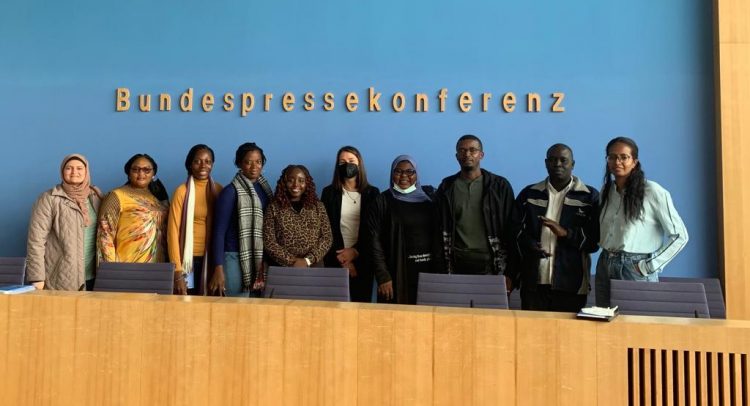The journalist at the Bundespressekonferenz
A SELECTED group of journalists from 16 African countries have held discussions on press freedom with their German counterparts in Berlin, Germany.
The meeting formed part of the maiden workshop for African journalists organised by the Taz Panter Foundation of the Taz die tageszeitung, an independent German newspaper, with funding from the German Foreign Office under the theme, “Access: Connecting in Times of Pandemic.”
At the Federal Press Conference, Bundespressekonferenz (BPK) building where the meeting was held, Jana Wolf, a journalist based at the Berlin parliamentary editorial office of the Rheinische Post, and board member of the BPK, shared the history of the unique model which is an example of press freedom of the press in Germany.
She said the Bundespressekonferenz was formed by journalists in 1949 with the aim of organising press conferences with leading representatives from politics, economics, and culture.
Unlike in other countries where state officials call for media briefing, Ms Wolf said it is the BPK that calls for the press conference and decides who will provide information on which topic.
She indicates that during the fixed scheduled meeting every Monday, Wednesday, and Friday, the government spokesperson and the spokespersons of the ministries are available to answer all questions relating to political events by the journalists.
“All of the press conferences are open only to members of the BPK and the Verein der AusländischenPresse in Deutschland (VAP; association of the foreign press). Guests may be permitted under exceptional circumstances, but they are not allowed to ask questions,” she said.
The BPK is organised as a registered association and financed by membership dues which currently has more than 900 parliamentary correspondents as members.
Ms Wolf said members are German citizens who report from Berlin or Bonn on federal politics as their main occupation.
Foreign journalists who work in Germany and Germans who have worked abroad agree there is nothing comparable to the BPK elsewhere, describing it as ‘unique in the world’ and so did the African journalists, who said that such an institution would greatly improve the freedom of the press in Africa.
Taz Workshop
The first part of the workshop begun with months of online training series of 12 webinars on topics which include COVID-19 and the Global South; Gender; Fake News and Disinformation and Digital Security and Migration, among others, followed by a two-week in-person meeting in Berlin.
The participants of the workshop were drawn from Ghana, South Africa, Kenya, Nigeria, Ethiopia, Egypt, Uganda, Cameroun, Mali, Rwanda, Tanzania, Algeria, Zimbabwe, Somalia and Sudan.
A board member of the Taz Foundation, Konny Gellenbeck, stated, “We are doing this because we think independent journalism is the basis of democracy, and all over the world journalism is under pressure.”
She said that the workshop would also promote networking and collaborations amongst African journalists, adding that journalists in Germany and Europe would also get to hear the experiences of their colleagues in Africa.
Another board member of the foundation who was part of the group of young people who founded the newspaper, Micheal Sontheimer, said the Taz newspaper was established to influence change in government policy and to ensure transparency and accountability in governance.
He explained that the media was critical in influencing change through setting public agenda for appropriate action by relevant stakeholders.
FROM Jamila Akweley Okertchiri, Berlin, Germany


